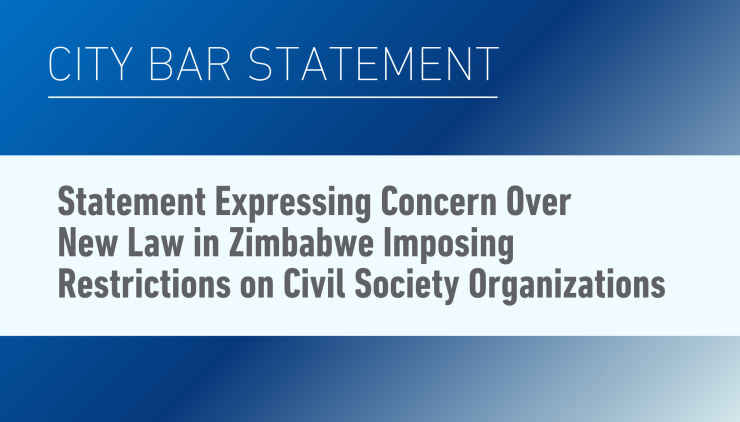This website uses cookies so that we can provide you with the best user experience possible. Cookie information is stored in your browser and performs functions such as recognising you when you return to our website and helping our team to understand which sections of the website you find most interesting and useful.
City Bar Statement Expressing Concern over New Law in Zimbabwe Imposing Restrictions on Civil Society Organizations
June 2025The Vance Center signed on to a statement by the New York City Bar Association expressing serious concern about the Private Voluntary Organisations (PVO) Amendment Act and calling on Zimbabwe's government to immediately repeal the law and engage in a genuine, consultative reform process.

In a new statement, the New York City Bar Association expressed deep concern about the Private Voluntary Organisations (PVO) Amendment Act, signed into law by Zimbabwean President Emmerson Mnangagwa in April. The legislation threatens the rule of law in Zimbabwe and fundamental rights as defined under international and regional human rights law, including freedom of association and assembly and freedom of expression.
In 2024, Zimbabwe’s Parliament passed the PVO Amendment Bill. Despite objections from civil society actors, on April 11 President Mnangagwa signed into law the Private Voluntary Organizations Amendment Act, which amended the PVO Act as well as related Acts on Money Laundering, Criminal Matters, and National Security.
The PVO Amendment Act purportedly aims to curb money laundering and the financing of terrorism. However, the statement notes that national and international civil society actors, legal experts, and United Nations experts have consistently raised concerns that the law is primarily designed to restrict the operations of civil society organizations (CSOs), especially those working on governance, human rights, and electoral transparency.
“The PVO Amendment Act raises serious concerns regarding the disproportionate restrictions imposed on civic space, the rule of law, and the exercise of fundamental rights in Zimbabwe,” the statement says.
The new law allows the Zimbabwean government to cancel or refuse registration of CSOs; imposes penalties for failure to register, including fines and imprisonment; establishes a new Office of the Registrar with oversight over the registration process; and imposes restrictions on the activities that CSOs can engage in.
It also disproportionately impacts marginalized and vulnerable groups and limits the capacity of CSOs to provide essential services and advocate for groups including women, youth, and persons with disabilities—communities that often rely heavily on CSOs for representation and access to fundamental rights.
“These sweeping limitations will not only stifle the voices of these vulnerable populations but also exacerbate existing social inequalities and systemic discrimination, reinforcing barriers to inclusion and deepening social harm,” the statement says.
In the statement, the City Bar emphasizes its commitment to the protection of fundamental human rights and civil society organizations and acknowledges the importance of promoting transparency and accountability in civic space. However, it adds, “any regulations must be carefully reviewed to ensure they serve legitimate purposes and adhere to international and regional standards regarding freedom of association and expression. The enactment of this law marks a grave assault on civic space, democratic freedoms, and Zimbabwe’s international and regional legal obligations.”
This law is the latest in a global wave of legislation that restricts the activities, financial support, or operations of civil society organizations. The New York City Bar Association has previously noted how such laws could potentially violate a number of international human rights laws and standards, including in a March 2024 statement about legislation to regulate non-profit organizations in Paraguay and an April 2025 statement on similar legislation in Peru.
The New York City Bar Association urges Zimbabwean authorities to “review the Act considering the protections outlined under regional and international law, and to initiate a dialogue aimed at adopting new regulations that ensure transparency and fundamental rights.” It also calls on authorities to authorities to “refrain from imposing burdensome requirements on civil society organizations that infringe on the rights of victims of human rights violations to access justice, endanger human rights defenders, and limit civic space.”
The City Bar’s African Affairs Committee, International Human Rights Committee, and Council on International Affairs also signed on to the statement.
Read the full statement here:


